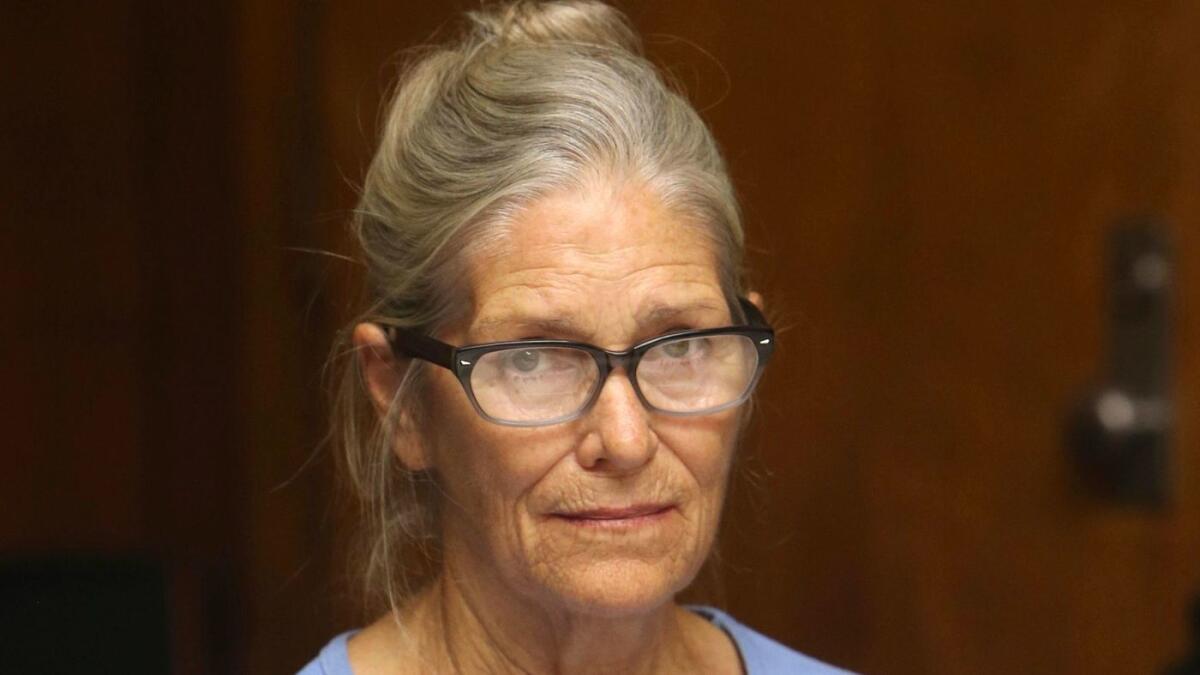Newsom denies parole to Charles Manson follower Leslie Van Houten, overruling parole board

- Share via
California Gov. Gavin Newsom overruled a parole board’s decision to free Charles Manson follower Leslie Van Houten on Monday, marking the third time a governor has stopped the release of the youngest member of Manson’s murderous cult.
Van Houten, 69, is still a threat, Newsom said, though she has spent nearly half a century behind bars and received reports of good behavior and testimonials about her rehabilitation.
“While I commend Ms. Van Houten for her efforts at rehabilitation and acknowledge her youth at the time of the crimes, I am concerned about her role in these killings and her potential for future violence,” he wrote in his decision. “Ms. Van Houten was an eager participant in the killing of the LaBiancas and played a significant role.”
It was the first time Newsom rejected parole for Van Houten. Former Gov. Jerry Brown denied her release twice.
Van Houten was 19 when she and other cult members stabbed to death wealthy Los Angeles grocer Leno LaBianca and his wife, Rosemary, in August 1969. She said they carved up Leno LaBianca’s body and smeared the couple’s blood on the walls.
The slayings came the day after other Manson followers, not including Van Houten, killed pregnant actress Sharon Tate and four others in violence that spread fear throughout Los Angeles and riveted the nation.
No one who took part in the Tate-LaBianca killings has been released from prison.
Earlier this year, Newsom reversed a parole recommendation to free Manson follower Robert Beausoleil for an unrelated murder. Beausoleil was convicted of killing musician Gary Hinman.
At parole hearings, Van Houten described a troubled childhood that led her to use drugs and hang around with outcasts at school. When she was 17, she and a boyfriend ran away to San Francisco during the so-called Summer of Love in 1967.
She later encountered Manson while traveling the coast. Manson had holed up with his “family” at an abandoned movie ranch on the outskirts of Los Angeles when he launched a plan to spark a race war by committing a series of random, terrifying killings.
Despite her youth at the time of the crime, abuse by Manson and more than four decades of good behavior, Brown rejected parole for Van Houten in 2017 because he said that she still blamed the cult leader too much for the killings.
A Los Angeles Superior Court judge upheld Brown’s decision last year, finding that Van Houten posed “an unreasonable risk of danger to society.” An appeals court will decide whether to uphold or reject that ruling by the end of July.
Manson and his followers were sentenced to death in 1971, though those punishments were commuted to life in prison after the California Supreme Court ruled capital punishment unconstitutional in 1972.
Van Houten’s case was overturned on appeal and she was later convicted and sentenced to seven years to life in prison.
Tate’s sister, Debra Tate, has routinely shown up to parole and court hearings to oppose the release of any Manson follower. Even though Van Houten didn’t take part in her sister’s killing, Tate said she didn’t deserve release under any circumstances.
Supporters of Van Houten said she had been a model prisoner who mentored dozens of inmates and helped them come to terms with their crimes.
Van Houten’s lawyer said in January after her latest release recommendation that the parole board found she had taken full responsibility for her role in the killings, so Newsom would have a harder time overturning the decision to release her.
“She chose to go with Manson,” attorney Rich Pfeiffer said. “She chose to listen to him. And she acknowledges that.”
Manson died in 2017 of natural causes at a California hospital while serving a life sentence.
More to Read
Sign up for Essential California
The most important California stories and recommendations in your inbox every morning.
You may occasionally receive promotional content from the Los Angeles Times.










